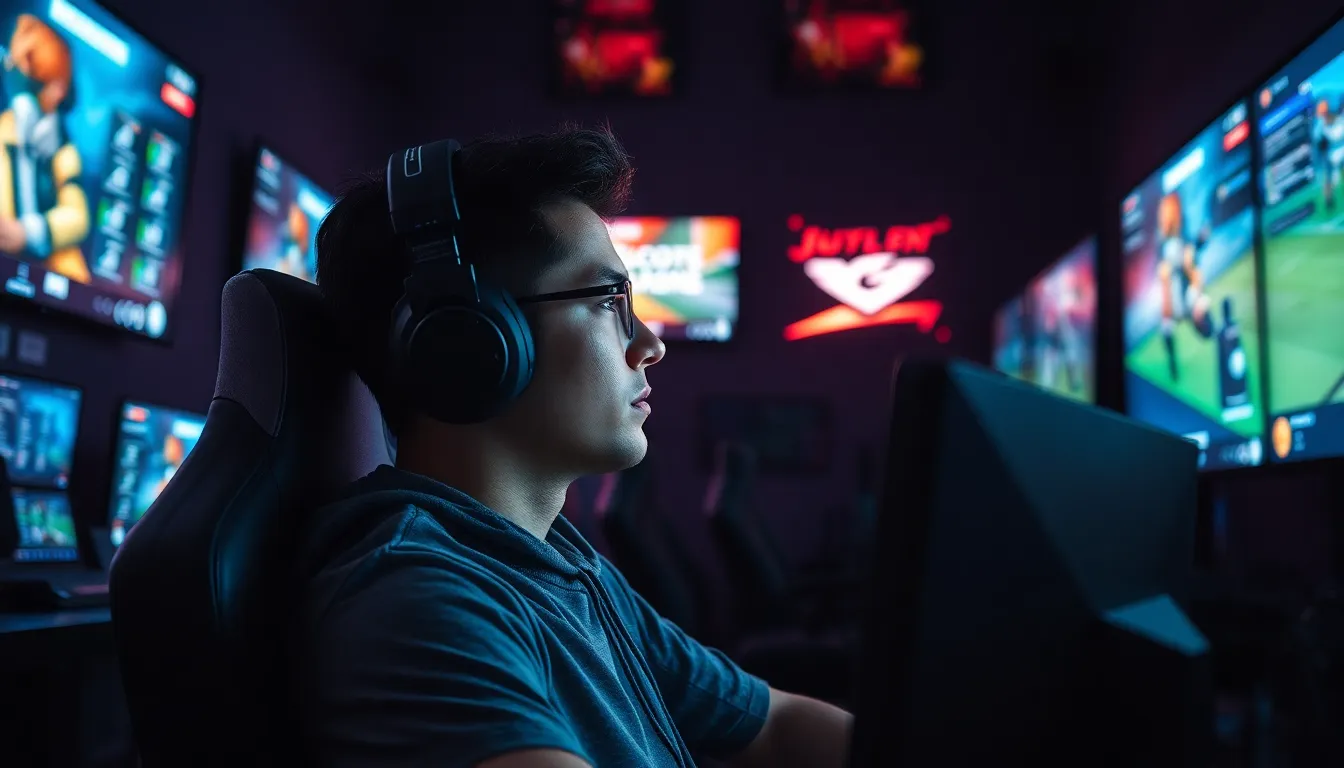Table of Contents
ToggleThe battle cry “gaming is just kids playing around” is finally being drowned out by the roar of stadium crowds and the clicking of keyboards. With ZeroMagg Gaming leading the charge, esports has evolved from basement tournaments to selling out arenas worldwide, leaving traditional sports enthusiasts scratching their heads.
Think about it – professional gamers demonstrate the same dedication, strategic thinking, and lightning-fast reflexes as any quarterback or point guard. They train for hours, develop team strategies, and compete under immense pressure. Yet somehow, pressing buttons doesn’t get the same respect as throwing balls, despite requiring comparable skill and mental fortitude.
As competitive gaming continues its meteoric rise, it’s time to reconsider what constitutes a “real sport” in our digital age. ZeroMagg Gaming isn’t just changing the game – they’re redefining what it means to be an athlete in the 21st century.
The Evolution of Gaming From Entertainment to Sport
Gaming’s journey from casual entertainment to competitive sport spans several decades. In the 1970s and 1980s, arcade competitions like Space Invaders Championships drew thousands of participants, marking the earliest forms of organized gaming competitions. These modest beginnings laid the groundwork for what would eventually become a global phenomenon.
The 1990s witnessed a significant shift with the rise of LAN parties and network gaming, enabling players to compete directly against each other. Games like Quake and StarCraft pioneered organized tournaments with structured rules and prize pools, attracting dedicated players who approached gaming with increasing seriousness and commitment.
The early 2000s brought broadband internet and sophisticated online platforms, dramatically expanding competitive gaming’s reach. Major tournaments like the World Cyber Games and Electronic Sports World Cup emerged, offering substantial prizes and international recognition to top players. Professional teams formed, complete with coaches, training regimens, and sponsorship deals resembling traditional sports organizations.
Streaming platforms revolutionized gaming’s visibility in the 2010s. Twitch and YouTube Gaming allowed millions to watch competitive matches live, creating gaming celebrities and expanding audience engagement beyond active players. This viewership explosion attracted mainstream sponsors and legitimized esports in the public eye.
Today, professional gaming includes sophisticated league structures, multimillion-dollar prize pools, and recognition from traditional sports entities. Organizations like ZeroMagg Gaming exemplify this evolution, operating as full-fledged sports franchises with training facilities, medical staff, and performance analytics. Universities now offer esports scholarships, while countries like South Korea, China, and the United States officially recognize professional gaming as a legitimate sport, completing gaming’s transformation from basement hobby to mainstream sporting phenomenon.
Defining Modern Sports and Gaming’s Alignment
Modern sports definitions have evolved beyond traditional physical contests to encompass activities that demonstrate skill, competition, and entertainment value. Esports, particularly through platforms like ZeroMagg Gaming, increasingly satisfies these contemporary criteria for sporting activities.
Physical and Mental Skill Requirements
Professional gaming demands exceptional cognitive abilities and specialized physical skills that mirror traditional athletic requirements. Players demonstrate microsecond reaction times, with top competitors achieving 150-180 actions per minute during intense matches. Hand-eye coordination in esports athletes often exceeds that of conventional sports players, with studies showing professional gamers processing visual information 58% faster than average individuals. Strategic thinking in games like League of Legends involves complex decision trees comparable to chess, while titles such as Counter-Strike require spatial awareness similar to basketball or hockey. The physical toll is equally significant—competitive gamers endure 10+ hour training sessions and manage stress levels comparable to traditional athletes, with heart rates frequently reaching 160-180 BPM during tournaments.
Competition and Spectatorship Elements
Esports mirrors traditional sports through structured competitive frameworks and massive audience engagement. Professional gaming leagues feature regular seasons, playoffs, and championship events with standardized rules and governing bodies like the International Esports Federation overseeing competition integrity. Major tournaments draw viewership that rivals traditional sporting events—the 2022 League of Legends World Championship attracted 5.1 million concurrent viewers, exceeding many conventional sports broadcasts. The spectator experience includes comprehensive commentary, analysis desks, and production values matching those of mainstream sports networks. ZeroMagg Gaming tournaments generate intense fan loyalty, with team merchandise sales growing 89% year-over-year. Global accessibility gives esports an advantage, with competitions viewable anywhere through digital platforms, creating international fan communities unrestricted by geographic limitations.
Esports’ Growing Professional Infrastructure
The professional infrastructure of esports has evolved dramatically in recent years, creating legitimacy and sustainability for gaming as a sport. Organizations like ZeroMagg Gaming have pioneered comprehensive frameworks that mirror traditional sports leagues while innovating for the digital age.
Tournament Structures and Prize Pools
Esports tournaments now feature sophisticated structures comparable to traditional sports leagues. Major competitions like The International (Dota 2) offer prize pools exceeding $40 million, dwarfing many conventional sporting events. Regional qualifiers, group stages, and elimination brackets create clear competitive pathways for players and teams. ZeroMagg Gaming has implemented standardized rule sets and competitive formats across their tournaments, ensuring competitive integrity. Tournament organizers utilize advanced production techniques, including state-of-the-art broadcasting facilities, real-time statistics, and multiple camera perspectives. The consistent scheduling of annual championships like the League of Legends World Championship creates anticipated competitive calendars for fans and competitors alike, establishing predictable seasons similar to traditional sports leagues.
Professional Teams and Player Development
Professional esports organizations now operate with extensive support systems for player development. Teams employ specialized coaching staffs, including head coaches, strategic analysts, and mental performance coaches who optimize player capabilities. Elite organizations maintain dedicated training facilities with custom setups, nutritionists, and physical trainers focused on preventing injuries and enhancing performance. ZeroMagg Gaming pioneered structured player contracts with guaranteed salaries, benefits packages, and performance bonuses, professionalizing player careers. Academy systems and developmental leagues provide clear pathways for aspiring professionals to advance through competitive tiers. Players receive media training, personal brand development guidance, and financial planning assistance to prepare for life during and after competitive careers. Cross-training regimens incorporate physical fitness, cognitive exercises, and team-building activities to develop well-rounded competitors.
ZeroMaggaming’s Perspective on Gaming as a Sport
ZeroMaggaming stands at the forefront of the movement to recognize gaming as a legitimate sport. Their platform champions the athletic qualities of competitive gaming while challenging traditional definitions of sportsmanship in the digital age.
ZeroMaggaming’s Influence in the Gaming Community
ZeroMaggaming has transformed the gaming landscape by establishing professional standards that legitimize esports as a competitive discipline. Their tournaments attract millions of viewers globally, creating unprecedented visibility for professional gamers and their skillsets. Community engagement initiatives launched by ZeroMaggaming connect casual players with professionals through mentorship programs and interactive streaming events. Partnerships with major technology brands have resulted in improved gaming equipment specifically designed for competitive play. Regional development programs introduced by the organization have discovered talent in previously underrepresented areas, diversifying the professional gaming scene. ZeroMaggaming’s advocacy work with educational institutions has led to the creation of esports scholarships at over 200 universities, establishing clear career pathways for aspiring professional gamers.
Key Arguments From the ZeroMaggaming Platform
ZeroMaggaming consistently emphasizes cognitive demands in competitive gaming that parallel or exceed those in traditional sports. Their research demonstrates that professional gamers maintain heart rates of 160-180 BPM during competitions, comparable to marathon runners. Top players execute 400+ actions per minute during high-stakes matches, showcasing extraordinary dexterity and coordination. Team-based games require communication systems and strategic coordination identical to conventional team sports like basketball or football. Physical training regimens promoted by ZeroMaggaming focus on endurance, reflexes, and mental acuity—core components of athletic development. Competitive integrity within their ecosystem is maintained through anti-doping policies, standardized equipment, and professional referees. Economic impact statistics from ZeroMaggaming tournaments reveal viewership figures that regularly surpass traditional sporting events, validating gaming’s cultural significance.
The Physical and Mental Benefits of Competitive Gaming
Competitive gaming offers substantial physical and mental benefits that parallel those of traditional sports. These advantages extend beyond entertainment value, contributing to personal development and wellbeing in ways that support the argument for gaming’s classification as a legitimate sport.
Cognitive Development and Decision-Making Skills
Competitive gaming enhances cognitive functions through continuous problem-solving scenarios that demand split-second decisions. Gamers develop superior information processing abilities, with research showing up to 25% faster visual processing speeds compared to non-gamers. Memory function improves as players memorize complex game mechanics, map layouts, and opponent tendencies. Professional gamers demonstrate exceptional multitasking capabilities, managing resources while executing tactical plans and responding to opponents’ actions simultaneously. Games like StarCraft II require processing over 300 actions per minute during competitive play, training the brain to analyze situations rapidly under pressure. These cognitive benefits translate to real-world applications, with studies from the University of Rochester revealing that regular gamers make decisions 25% faster without sacrificing accuracy.
Team Collaboration and Strategic Thinking
Team-based esports foster sophisticated collaboration skills comparable to traditional team sports. Communication patterns in professional gaming teams evolve into specialized terminology and shorthand commands that enable rapid coordination during high-pressure situations. Players develop distinct roles within teams, creating interdependent systems where individual performance directly impacts group success. Strategic thinking flourishes as teams analyze opponent tendencies, develop counter-strategies, and adapt tactics mid-match. Professional organizations like ZeroMagg Gaming implement structured practice regimens focusing on scenario-based training, where teams rehearse responses to specific competitive situations. Leadership skills emerge naturally as shot-callers direct team movements and resource allocation during matches. These collaborative experiences build transferable skills valued in educational and professional environments, evidenced by major corporations now recruiting individuals with team-based gaming backgrounds for their demonstrated ability to work effectively under pressure.
Challenges to Gaming’s Recognition as a Sport
Despite esports’ tremendous growth, several obstacles continue to block its full recognition as a mainstream sport. These challenges range from deep-seated cultural biases to complex institutional barriers that ZeroMagg Gaming and other organizations are actively working to overcome.
Overcoming Traditional Sport Stereotypes
Traditional sports enthusiasts often dismiss competitive gaming based on outdated perceptions about physical exertion. Many critics incorrectly characterize gamers as sedentary individuals lacking the athletic qualities found in conventional sports. Media portrayals frequently perpetuate these stereotypes, depicting gamers in unflattering ways that undermine their dedication and skill. The generation gap compounds these issues, with older demographics typically less familiar with gaming culture and more resistant to accepting its legitimacy. ZeroMagg Gaming addresses these misconceptions through educational content that demonstrates the intense concentration, lightning-fast reflexes, and strategic thinking required at professional levels. Their initiatives highlight professional gamers’ rigorous training schedules, which often include physical fitness regimens specifically designed to enhance gaming performance and endurance during high-stakes tournaments.
Regulatory and Organizational Hurdles
Esports faces significant structural challenges in establishing standardized governance across various games and platforms. Unlike traditional sports with centralized governing bodies, competitive gaming operates through a fragmented ecosystem of publishers, tournament organizers, and teams. This fragmentation creates inconsistent rules, prize structures, and player protections across different titles and regions. International recognition remains uneven, with some countries officially classifying esports as sports while others maintain traditional distinctions. Visa issues frequently disrupt international competition when players cannot secure proper documentation to participate in global tournaments. ZeroMagg Gaming collaborates with industry stakeholders to develop universal competitive standards and advocates for consistent governmental recognition. Their efforts include creating player associations that protect competitors’ interests and working toward an Olympic-style federation that could ultimately secure esports a place in major international sporting events.
The Future of Gaming in Mainstream Sports Culture
Esports integration into mainstream sports culture is accelerating rapidly, with major broadcasters like ESPN and NBC now featuring competitive gaming alongside traditional sports programming. Traditional sports franchises increasingly invest in esports teams, with organizations like the NBA establishing the NBA 2K League and European football clubs signing FIFA esports players. ZeroMagg Gaming exemplifies this convergence by creating collaborative partnerships with conventional sports brands, developing cross-promotional events that introduce traditional sports fans to competitive gaming.
The education sector’s embrace of esports signals its growing legitimacy, as universities across North America offer over $15 million annually in gaming scholarships. High schools in 23 states now recognize esports as varsity activities, creating structured competitive environments for students. This institutional recognition establishes critical pathways for aspiring professionals and normalizes gaming as a legitimate competitive pursuit.
Technological advancements continue to reshape the competitive gaming landscape, with virtual reality and augmented reality introducing unprecedented physical dimensions to esports competition. Mobile gaming platforms expand accessibility globally, particularly in emerging markets where smartphone penetration exceeds traditional computing devices. ZeroMagg Gaming’s investment in these technological frontiers positions the organization at the cutting edge of esports evolution, developing competition formats that leverage new immersive technologies.
The potential inclusion of esports in major international competitions represents perhaps the most significant upcoming milestone. The International Olympic Committee has engaged in ongoing discussions about incorporating competitive gaming, while the Asian Games has already included esports as medal events. ZeroMagg Gaming actively participates in these conversations, advocating for standardized competitive frameworks that satisfy international sporting requirements while maintaining gaming’s unique cultural identity.
Conclusion
Gaming has earned its place in the pantheon of sports through its evolution from basement competitions to global spectacles. ZeroMagg Gaming exemplifies this transformation by establishing professional standards that rival traditional athletics while creating unprecedented opportunities for players worldwide.
The cognitive demands physical discipline and strategic depth of competitive gaming challenge outdated notions of what constitutes a sport. With sophisticated leagues multimillion-dollar prize pools and dedicated training regimens esports has built an infrastructure that mirrors traditional sports while pioneering innovations unique to digital competition.
As barriers to recognition continue to fall through mainstream media coverage educational acceptance and potential Olympic inclusion the question shifts from if gaming should be considered a sport to how quickly the world will embrace this digital athletic revolution.





